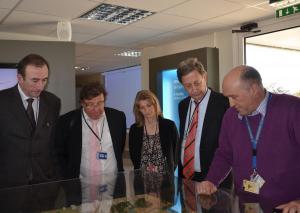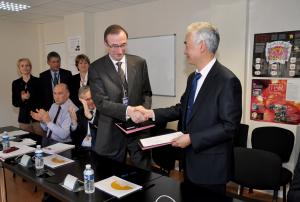Major logistic challenges ahead
21 Mar 2012
-
Robert Arnoux
Buildings & Site Infrastructure Head Tim Watson introduces the DAHER delegation and the local government representative to the installation mockup. From left to right: DAHER Director-General Jean-Paul Laffite; Deputy Director for Roads (CG 13) Daniel Wirth; DAHER Operations manager for ITER Laurence Prudhomme; and DAHER CEO Patrick Daher.
A little more than a month ago, after a long and complex international tendering process, the Logistics Service Provider Framework Contract for the transport of the ITER components was awarded to the DAHER Group, a worldwide integrated equipment and services supplier.
On Monday 19 March, a kick-off meeting brought together the ITER Organization and the DAHER Group top management; representatives of Agence Iter France; French security authorities (General Mondoulet, regional head of Gendarmerie attended the meeting); members of the local government of Bouches-du-Rhône; and, by way of video conference, two members of the European Domestic Agency Fusion for Energy.
The different functions and responsibilities of the participants were a clear indication of the complexity of the task ahead: transporting the ITER components from their production sites to Cadarache will involve many players in countries all over the world, and coordination between them will be paramount.
To DAHER CEO Patrick Daher, whose great-grandfather founded the company in 1863, ITER Director-General Osamu Motojima stressed "the strategic importance" of the company's mission and acknowledged "the logistics challenge of major proportions" that had to be faced.
The DAHER Group, whose 7,500 staff are now present in 14 countries, has accumulated a century and a half of experience in "transporting things," from industrial boilers to nuclear reactor and giant aircraft components.
As CEO Patrick Daher, Director-General Jean-Paul Laffite and their transport specialists explained to the ITER management, the Group has developed sophisticated tools and procedures to manage the logistics and administrative challenges of international transportation. Still, with "the Devil hiding in the details," they know that in the case of ITER components, "no transport will be easy."
The last leg of the components' long voyage will indeed be the most challenging, both technically and in terms of impact on the local residents.
Over a period of five years beginning in 2014, ITER convoys—some of them exceptionally large, or heavy, or wide—will travel the 104-kilometre ITER Itinerary, principally by night. Roads will have to be temporarily closed, local traffic will be disrupted, and security measures implemented ...
ITER Director-General Osamu Motojima and DAHER Director-General Jean-Paul Laffite signed the first Task Order of the Logistics Service Provider Framework Contract.
"As these convoys will be the first real contact of the local population with the ITER project, we have to make sure that this experience is a positive one," said DG Motojima, "one that will make them proud of being part of the ITER Project."
We are still two years from the first actual convoy, but for all those involved this lead-up period will be particularly busy. "Preparation is ninety percent of success," said Laurence Prudhomme, DAHER operations manager for the ITER contract.
From the CEO down to the transport specialists, the DAHER delegation stressed the "very strong commitment" they felt toward the ITER Project. "We do feel we are part of a historical project," said Patrick Daher in his opening statement. "We understand our responsibility and we are proud of the trust that the ITER Organization has placed in our company."



